 The Road to Serfdom The Road to Serfdom
F. A. HayekNobel prize winner F.A. Hayek demonstrates that the
collectivist idea of empowering government with increasing economic
control inevitably lead not to utopia but to the horrors of nazi
Germany and fascist Italy. As Hayek demonstrates, one law leads to
another, and the logic of state intervention culminate in an absurd
system far remote from the good intention of its promoters. Drug
prohibition is a potent example of this theory. Unable to stop drugs,
the government increasingly implements more and more regulations
resulting in a constant diminution of personal rights and freedom. When
bottles of water are considered "paraphernalia", you know that the
totalitarian logic is approaching its "final solution". more information about this book |
| |
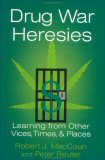 Drug War Heresies Drug War Heresies
Robert J. MacCoun, et alWhat? There are better solutions than repression? The
US drug policies are closer to the ones implemented by third world
countries known for human rights violation than to policies adopted
elsewhere in the west. The US leadership in moral issues is long gone.
Hopefully, facts based policies will overcome "bad faith based"
initiatives of a government gone astray. more information about this book |
| |
 Legalize This! The case for decriminalizing drugs Legalize This! The case for decriminalizing drugs
Doug HusakThere are more drug offenders in US jails, than criminals
in the entire EU prison population. More than half of high school
seniors take drugs. How many more prison guards do you want? Also, as
per writer, psychological tests show that adults who have experimented
with drugs - but are not addicts - are better adjusted than either
abstainers or heavy users. Given what has become of GWB since he has
stopped doing coke, who can argue with this? more information about this book |
| |
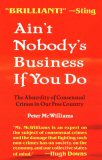 Ain't Noboby Business if You Do: The Absurdity of Consensual Crimes in Our Free Society Ain't Noboby Business if You Do: The Absurdity of Consensual Crimes in Our Free Society
Peter McWilliamsHimself a victim of the drug war
(jailed for trying to alleviate his painful last days with that vicious substance called pot!),
McWilliams understands clearly that the existence of a crime requires a victim.
And that victim has to be somebody (and not "society", "virtue" or "morality"). more information about this book |
| |
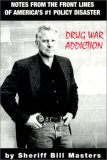 Drug War Addiction Drug War Addiction
Bill MastersCops against the drug war are numerous. However,
only a few have come out, and none more so than Bill Masters. The
conclusions are probably obvious to students of public choice economics.
Government entities are there to self-perpetuate. The DEA is no
exception..... more information about this book |
| |
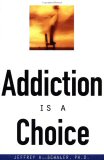 Addiction is a Choice Addiction is a Choice
Jeffrey SchalerOf course it is. Else it would be a disease. And
how on earth could a disease be a crime? Choices can be decriminalized.
That's another issue. In the meantime, addicts will keep choosing their
behavior. Unfortunately for now, punishment addicts will keep jailing
them..... more information about this book |
| |
 Saying Yes: In Defense of Drug Use Saying Yes: In Defense of Drug Use
Jacob SullumUse? Abuse? Just an obtuse distinction to justify repression based on the real evil that is recreation. Gazzilion of casual users will never suffer any material negative consequences for using drugs. That is, of course,
if they don't get busted.
Carpet bombing laws based on extreme anecdotes don't make for good laws
(Just see the PATRIOT Act for a more recent illustration of this basic legal principle). more information about this book |
| |
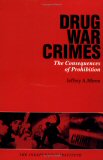 Drug War Crimes: The Consequences of Prohibition Drug War Crimes: The Consequences of Prohibition
Jeffrey MironProhibition, like all other wide,
well meaning legislative intervention,
has unforeseen and unintended consequences.
Well, these consequences are now obvious,
and well exposed in this book. In effect,
a reflection of the Road to Serfdom applied to prohibition.
Leftists may not agree,
but economics is a better argument than spiritual guess to promote legalization. more information about this book |
| |
|
|